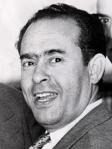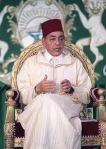
After “Les Immortels” by Franklin Boukaka, it is only normal that I would talk about Mehdi Ben Barka himself, and why he brought so much hope to people in Morocco, Africa, and the entire world. Yes, his work encompassed all the oppressed people of the globe.
Mehdi Ben Barka was a Moroccan politician born in January of 1920 in Rabat, Morocco. Although from a middle class background, Ben Barka was among the first to attend the French school (which was mostly for rich people), as he was always the best and brightest in his class. He was the first Moroccan to receive a degree in mathematics in an official French school in 1950. He then taught mathematics in a local Lycée (high school), and at the Royal College, where young Hassan II was one of his students. Working in parallel, Mehdi got involved in politics, and worked to challenge the French “Protectorate” on Morocco. In 1943, he got involved in the creation of the National Istiqlal Party. In 1955, Mehdi took part in negociations which culminated with the return of Sultan Mohammed V, who had been exiled by the French authorities to Madagascar. In 1956, Ben Barka’s other negociations culminated with the end of the French protectorate on Morocco. From 1956 to 1959, Mehdi Ben Barka was president of the consultative assembly of Morocco. In 1959, Mehdi broke off from the National Istiqlal Party after clashes with conservative opponents, and found l’Union Nationale des Forces Populaires – National Union of Popular Forces (UNPF).

The future King Hassan II, then chief of the army, wanting to inherit his father’s trone as soon as possible, called for repression against subversion, against any opposition in the land. This forced Ben Barka to go on exile in Paris, as Ben Barka was King Hassan II’s principal opponent. After King Mohammed V’s death in 1961, Hassan II ascended to the throne, and claimed to want to make peace with his main opponent. Ben Barka returned from exile in May 1962. On 16 November 1962, Mehdi escaped an attack on his life (car accident, where his car was forced into a ravine by a police car), which had been fomented by the services of General Mohamed Oufkir and colonel Ahmed Dlimi. In June of 1963, Ben Barka was accused of plotting against the monarchy, and once again forced into exile; this was plot by King Hassan II, to dissolve the UNFP, the main opposition to his reign. On 22 November 1963, Ben Barka is sentenced to death in absentia, for conspiracy and attempt to assassinate the king. Some think that this was also caused by Ben Barka’s calling upon Moroccan soldiers to refuse to fight Algeria in the 1963 Sand War. Ben Barka first went on exile in Algiers, Algeria, where he met with Che Guevara, Amilcar Cabral, and Malcolm X. Then he went to Cairo, Rome, Geneva (where he escaped several attacks on his life), and Havana, trying to unite the revolutionary movements of the Third World for the Tricontinental Conference to be held in January 1966 in Havana. As the leader of the Tricontinental, Ben Barka was seen as a major figure in the Third World movement, and supported revolutionary, and anti-colonial actions in various states, thus provoking the anger of the United States and France. Just before his death, he was preparing the first Tricontinental Conference scheduled to take place in Havana, Cuba, from 3 -13 January 1966.

On October 29, 1965, Mehdi Ben Barka was abducted (“disappeared”) in Paris by French police officers. He was never to be seen again. On Dec. 29, 1975, Time magazine published an article called “The Murder of Mehdi Ben Barka”, stating that three Moroccan agents were responsible for the death of Ben Barka, one of them former Interior Minister Mohammed Oufkir. Speculation persists as to CIA involvement. French intelligence agents and the Israeli Mossad were also involved, according to the article. Many believe that the abduction and removal of Mehdi Ben Barka on that cold day of October 29, 1965, was to give a blow to the impetus of the Tricontinental Conference,which was going to have effects on liberation movements across the globe, and thus hurt imperialist powers (US, France, UK, Portugal, Spain…).
Indeed Mehdi Ben Barka was a true hero, some refer to him as the Moroccan Che Guevara… To many, he was hope itself… His charisma, and his work went beyond Morocco’s borders and blessed the entire globe, countries which were oppressed by imperialist powers and which over 50 years later are still suffering from neo-colonialism, and ferocious capitalism/imperialism. You can read more on how the French government is still stalling on the “Ben Barka affair” at the Guardian, and check out this interview of Bachir Ben Barka, Mehdi’s son, who was aged 15 at the time of his father’s abduction. Watch this really good documentary below which details the life of Mehdi Ben Barka. 50 years after his disappearance, the “Ben Barka affair” still remains an open dossier. One can only sing, like Franklin Boukaka, ‘Mehdi nzela na yo na bato nyonso’ … Mehdi your work is that of humanity! So long brother, your work and vision will keep guiding us. ‘Oh O Mehdi Ben Barka, Mehdi nzela na yo na bato nyonso.’


Pingback: Happy 2013! « African Heritage
Could you please share some more info about Mehdi Ben Barka, I can’t find the documentary anywhere.
LikeLike
Thanks Salma, I just changed the link. Don’t forget to check out the remaining parts 2 thru 5 of this documentary.
LikeLike
Pingback: Seymour Hersh zum Mord an Bin Laden & andere Nachrichten | barth-engelbart.de
Pingback: On the 50th anniversary of the assassination of El Mehdi Ben Barka | Tony Seed's Weblog
Thanks Tony for linking to this great article on Mehdi Ben Barka
LikeLike
Pingback: Mehdi - Guiding Light [MP3 + 320] | Free Download
Thanks for linking to this article and for visiting the blog.
LikeLike
Pingback: 9 African Leaders That Were Assassinated With US Government or Western Intelligence Support. – OBLONG MEDIA UNLIMITED